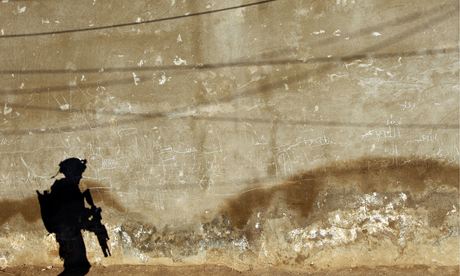
In his novel The Yellow Birds, which won the 2012 Guardian first book award, Kevin Powers, who served in the US army in Iraq between 2004 and 2005, wrote: "We were not destined to survive. The fact is we were not destined at all. The war would take whatever it could get. It was patient. It didn't care about objectives, or boundaries, whether you were loved by many or not at all. While I slept that summer, the war came to me in my dreams and showed me its sole purpose: to go on, only to go on." War's indifference is revisited in Powers's debut poetry collection, in which he never seeks to make war more, or other, than it is (the novel allegedly grew out of a poem, and its hero, Private Bartle, is re-encountered here).
It is far from straightforward keeping war real. Powers is interested in the distance created from a thing as soon as you start to describe it. He calls a gun a gun. In Great Plain he writes: "But guns are not ideas./ They are not things to which comparisons are made." At the same time he recognises that a poem about war is removed from war, is likely to have been written from a safe distance – or at least a lull in the fighting – and may offer order while describing chaos.
He dramatises the difficulty in Improvised Explosive Device, which begins: "If this poem had wires/ coming out of it,/ you would not read it." The poem is a device yet this one does not explode: "… But these/ are only words. Go on,/ they are safe to fold and put into your pocket./ Even better, they are safe/ to be forgotten."
This almost works but not quite. A poet does not write to be forgotten.
Powers has a defended voice with every reason under an Iraqi (or sometimes Texan) sun. Deflating endings are a speciality, as if to avoid paying war the compliment of a climax:
… It is night again and endless
are the stars. I can tell you exactly
what I mean. The world has been replaced
by our own ideas about the world.
This flat conclusion is not as exact as all that. More successful in its reductive way is the title poem's ending about war as "making little pieces of metal/ pass through each other". The bareness, unrescued by commentary, is typical Powers.
I've been reading these poems alongside Redeployment, a collection of short stories by Phil Klay, another American war veteran on his way to becoming a literary sensation. Imaginatively, Powers and Klay are comrades-in-arms. Each explores the gap between soldiers and I'm-alright-Jack civilians. Powers's Separation is a cry from the heart, about an encounter in a bar with oblivious lads in "pink popped-collar shirts" who have no understanding of what he has been through.
The best poems here allow mystery and unchecked emotion. A History of Yards describes his mother in her garden: "… she's watching as she has been/ each evening since I promised not to die". The Abhorrence of Coincidence mutinies against the idea that love is random. And After leaving McGuire Veteran's Hospital for the Last Time is a valediction in which poet and soldier are not the same. It is the former's job to take care of the latter. And yet, for all the veteran's emptiness, there is a musicality throughout and a following wind, a sense of: have poem, will travel.

